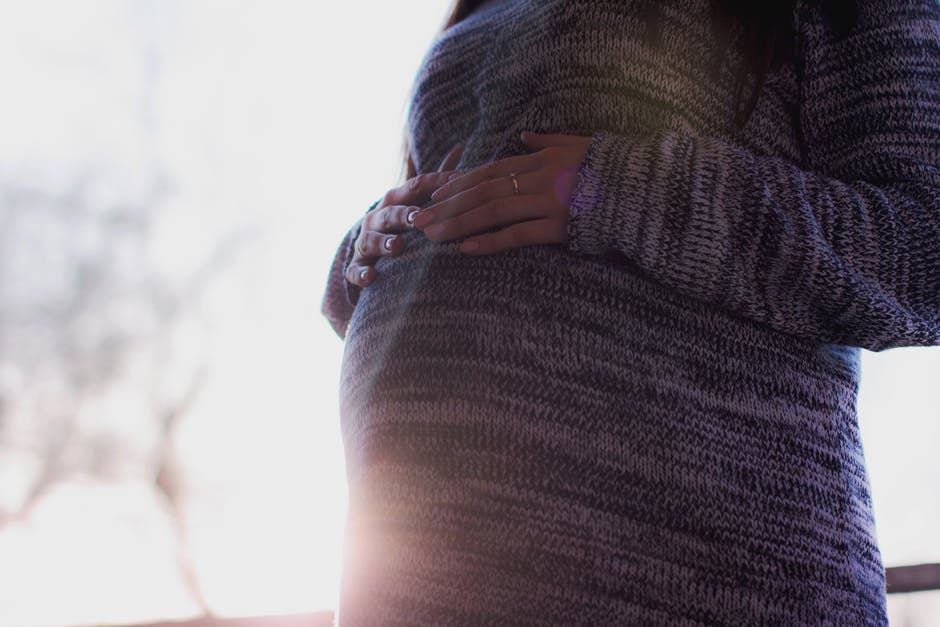
This is something I spent a lot of time working on because it was so close to home for me. I had pre-eclampsia in 2015 and it almost took my life. I want to spread awareness to all pregnant women and their families.
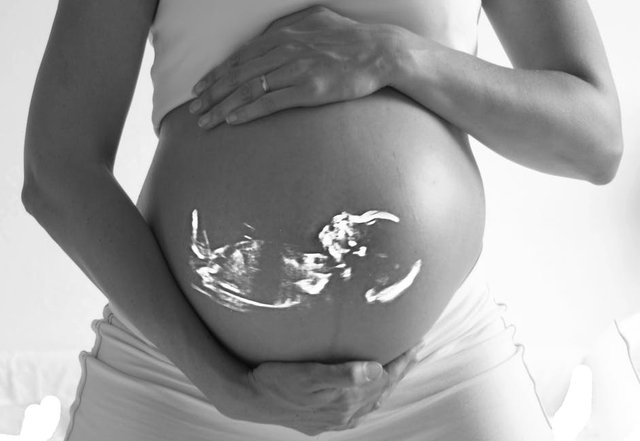
Before I can tell you about my experience with pre-eclampsia or how to take care of yourself when you have it, it’s important to understand exactly what pre-eclampsia is.
There are many things first time mothers are not educated about during pregnancy, and unfortunately it seems that many doctors are not making the proper effort to prepare their patients for certain obstacles, including pre-eclampsia.
Please note that I am not a doctor or a professional of any kind; I’m literally a nobody who is sharing personal knowledge and experience to help expand the knowledge of others.
Please contact your OBGYN immediately or go to the nearest emergency room if you think you have pre-eclampsia.
So what is pre-eclampsia?
According to WebMD, pre-eclampsia - also known as toxemia - is a condition that some women develop during pregnancy. It is marked by high blood pressure in women who may have not experienced high blood pressure before pregnancy.
Women who have pre-eclampsia will a high level of protein in their urine and usually suffer from swollen feet, legs, and hands.
Pre-eclampsia can develop any time during pregnancy, but it most often occurs after your 20th week. In my case, I was diagnosed at exactly 32 weeks.
It is vital that you monitor your health in the event that pre-eclampsia occurs, because if it goes undiagnosed it can turn into eclampsia, which can lead to seizures and even to the death of your baby or yourself.
Pre-eclampsia is also the leading cause of premature births. Not always, but often premature births can lead to complications immediately and even later on in life such as learning disabilities, cerebral palsy, epilepsy, hearing problems, and vision problems.
There’s also a risk that your baby’s lungs could be underdeveloped if he or she is born before 36 weeks. There’s a steroid shot you can be given that will force your baby’s lungs to grow rapidly, but it does not always help.
I am not saying any of this to scare you, but to educate you. It is serious. Please do not think that just because you have pre-eclampsia or eclampsia that you are going to die. I am proof that that is not true.
Signs and symptoms of pre-eclampsia
I’ve mentioned the classic symptoms of pre-eclampsia, but we’ll go over everything in greater detail:
High blood pressure
It is possible to have pre-eclampsia if you already have high blood pressure, but if you randomly develop high blood pressure any time after your 20th week of pregnancy, this should be the first red flag for your doctor, your midwife, and even yourself.
Pre-eclampsia can come on fast; for me it came in a matter of days. Because of how random and unforgiving pre-eclampsia can be, I recommend you periodically check your blood pressure at home.
Yes, you will have regular doctor appointments and health check ups while pregnant, but if your case is anything like mine, you will develop it between appointments.
I also had a provider who laughed at me when I told her I thought I had pre-eclampsia, so at that point it was up to me to take my health into my own hands. This is another reason I encourage you to check your blood pressure at home - just in case you have a lousy OBGYN like I did.
I was lucky enough to have constant access to my grandmother’s blood pressure cuff at home, but if you don’t have one you can buy one for little to nothing on Amazon or eBay.
In my opinion, blood pressure cuffs that squeeze your arm are more effective than the smaller cuffs that go around your wrist. I’m in no position to say that no wrist cuffs are accurate, but in my experience I had a better reading using one that took my blood pressure from my upper arm.
If you’re unsure what blood pressures are considered high, as a general rule your blood pressure should not exceed 140/90 while you are pregnant.
Protein in your urine
This is obviously a symptom you cannot physically see or feel, so a medical professional will have to diagnose this. However, once your urine has protein in it, there’s a good chance your OBGYN will begin to keep a close eye on you.
When I initially had protein in my urine, my OBGYN brushed it off - and again, I wasn’t a patient of the brightest crayon in the box.
I’ll explain my story at the end, but the protein levels in my urine seemed to start out low before doubling, tripling, and then just skyrocketing.
This poses a threat to your kidneys and can lead to permanent kidney damage, which is another reason you must pay close attention to symptoms of pre-eclampsia so it can be diagnosed immediately.
Swelling
Many women suffer from swelling during pregnancy, so swelling alone is not always a red flag.
In my case I ignored my swelling at first and I shouldn’t have.
If your ankles, legs, hands, and wrists are swollen and red, it might not be normal swelling. If you’re swollen on top of feeling fatigued or you just don’t have the energy to do anything, it’s worth mentioning to your OBGYN to be safe.
Rapid weight gain
This was one of my last symptoms, but it was certainly the most unforgiving part of having pre-eclampsia for me.
Every woman and every case of pre-eclampsia is different, so I cannot give you an exact number of extra pounds and say “Okay, this definitely means you’ve developed pre-eclampsia.”
It does not work that way unfortunately.
I do know, however, that a woman who has a healthy pregnancy should only gain 25-30 pounds.
Again, that’s not to say that a woman who gains 50 pounds absolutely has pre-eclampsia, but it is certainly a symptom to monitor closely when combined with other symptoms such as high blood pressure or swelling.
I thought I was doing great at first. As I approached 30 weeks pregnant I had gained about 22 pounds. Considering I've struggled with my weight all my life, I thought that was a wonderful accomplishment… until I developed pre-eclampsia and literally gained 18 pounds every three days for a couple weeks in a row.
By the time I had a c-section, I’d gained a total of 70 pounds. Damn you, pre-eclampsia.
Abdominal pain
Abdominal pain that is a result of pre-eclampsia will generally occur on the right side of your abdomen, although it’s not impossible to experience it on your left side, in the middle, or all over.
Sometimes the pain can be mistaken for heartburn, your baby kicking, or a stomach ache.
If you notice persistent abdominal pain on your right side and below your rib cage, you need to have it addressed immediately. You can never be too safe.
Terrible headaches that do not go away
This is another huge sign of pre-eclampsia. Many women have severe light sensitivity in addition to their severe headache.
I was fortunate enough to not experience these nuisances until a couple days before delivery, but once the headache began I was miserable.
Change of reflexes
Some women experience overactive reflexes as a result of their pre-eclampsia. As your blood pressure rises over time, your reflexes can become a bit exaggerated which can possibly lead to the seizures that are associated with eclampsia.
You’re urinating less
Reduced urine or no urine output should be an immediate red flag for you.
This is a very clear sign that there’s quite a strain on your kidneys, and again, I’m not a professional - but in my experience there’s a good chance you’ve got high levels of protein if your urine output has decreased.
I was in the hospital when I had pre-eclampsia, so my urine output was monitored around the clock. If you’ve not been diagnosed with pre-eclampsia but still want to take precautions to monitor your health, you should be able to ask your doctor for what they call a urine hat.
A urine hat is a plastic “hat” you insert under a toilet seat and it catches all of your urine. It’s marked like a measuring cup and will show you your urine output in ounces each time you use it.
Record your urine output in a journal, dump your urine, and go on about your day until it’s time to pee again.
If for some ridiculous reason your doctor cannot provide you with a urine hat, search “urine hat” on Google and there are tons of listings for urine hats that are literally less than $1.
Truthfully I don’t know how much urine per day is considered normal, and I don’t want to misguide you. You should ask a medical professional how much urine you should release per day.
Other than that, just journal your urine output and monitor your results to see if there has been a noticeable decrease.
Dizziness and/or vision changes
Dizziness as a symptom of pre-eclampsia is often overlooked. Maybe you don’t even realize you’re dizzy. I didn’t realize it at first.
This alone shouldn’t necessarily be a red flag, but like with other symptoms, dizziness combined with other issues should certainly be addressed.
As far as vision changes are concerned, you might see auras, flashing lights, or blurriness. These symptoms kind of tie into what I mentioned about headaches and light sensitivity.
Risk factors of pre-eclampsia
This information is also from the WebMD article I linked earlier, but developing pre-eclampsia exposes pregnant women to a slew of terrifying health conditions, including but not limited to stroke, seizures, water in the lungs, heart failure, kidney failure, blindness, bleeding from the liver, and continuing to bleed even after you’ve given birth.
It can also force you to have something called a placental abruption, meaning that the placenta separates itself from the uterus and your baby is no longer receiving food or oxygen from you.
I’m sure you can guess why this is a problem, but just to burn the importance of this into your brain, placental abruption often leads to stillbirths.
As far as risk factors concerning your baby, I mentioned above that pre-eclampsia can cause cerebral palsy, epilepsy, underdeveloped lungs, and so on.
Who is prone to preeclampsia?
There are a lot of factors to be considered when talking about who is prone to developing pre-eclampsia. A simple question might be who is not prone to developing it?
It’s in your genetics
It’s understood that genetics play a vital role in whether or not a woman is more likely than other women to develop pre-eclampsia. If your grandmother, mother, sister, or aunt had pre-eclampsia, there’s a good chance it runs in the family and you might be more likely than other women to develop it.
Another theory I have - which has NOT been proven by anyone - is that if your sexual partner’s mother had pre-eclampsia while pregnant with your partner, you could develop pre-eclampsia, too.
Again, I have zero evidence to back that up; however, my husband’s mother had eclampsia while she was pregnant with him, suffered from severe seizures, and almost died. It could be POSSIBLE that somehow it’s in John’s genes and somehow it affected our baby and/or me. These are strictly hypetheticals, though.
Women with poor nutrition before or during pregnancy
If your diet has been poor all your life or you simply can’t stop eating fast food while you’re pregnant, I’m here to break it to you that this has a tremendous effect on your pregnancy.
If your diet is poor, there’s a good chance you’ve got blood pressure issues, high cholesterol, excess body fat, and so on.
If this is the case, you might be more prone to develop pre-eclampsia than other women.
Do not be embarrassed if you feel you fall into this category; my diet was poor, too. I had to pay for it though; maybe you won’t have to if I instill fear into your brain about the dangers of poor nutrition while you're pregnant.
First time pregnancies and mothers 40 or older
I don’t have a scientific or even an intelligent answer as to why first time mothers / mothers over 40 are more likely to develop pre-eclampsia than others.
I simply know from personal experience and from personal research that this is often a risk factor.
Stress
This is another big one I’ll talk about in detail before briefly mentioning some other reasons a woman might be more prone to developing pre-eclampsia than women.
If you haven’t caught on yet, stress causes A LOT of problems. It affects much more than your emotions.
When you take into consideration the fact that stress can cause people to have strokes or heart attacks, why wouldn’t it be easy to understand that it can cause something like pre-eclampsia, too?
Think about it. The more stressed you become, the higher your blood pressure rises.
What happens when your blood pressure rises?
You’re likely to develop pre-eclampsia.
I can honestly say I think stress is the main problem that caused me to have pre-eclampsia. Again, I'll expand on that subject soon, but I'm serious. Stress can be a killer if you let it escalate far enough.
Other factors that make a woman more prone to developing pre-eclampsia
There are probably a thousand or more scenarios that would make a woman more susceptible to developing pre-eclampsia. I can't possibly name them all. Some reasons, though, are smoking, carrying more than one baby at a time, or having more than one baby with more than one partner.
Additionally, a woman with previous health issues is more likely to suffer pre-eclampsia. Diseases such as lupus, rheumatoid arthritis, diabetes, and kidney disease are all diseases that could greatly impact a woman's chances of developing pre-eclampsia.
How to avoid pre-eclampsia
If pre-eclampsia is in your genetics, you might not be able to avoid it, but there are measures you can take to steer clear of it as far as you can.
It's important to understand that there's no cure for pre-eclampsia, so once you have it you'll have to be on strict bed rest for your own safety and for your baby's.
Keep stress at a minimum
I know - easier said than done, right?
I get it.
It's important, though, that you work your hardest to keep stress at a minimum.
Accept the truth that some things are not changeable. I know things happen in our lives that make it impossible to avoid stress. Make up for those situations by not stressing about what you can't change.
For example, there's a baby in your tummy. Unless you plan on having an abortion, suck it up, baby. You are pregnant. That's something that's definite.
Work instead on the stressful parts of your life that do not have to be stressful.
Find another job if your current job is too demanding.
Get away from your partner if you are in a toxic relationship.
Stop eating your favorite food if it is making you sick.
Avoid taking hot baths
This goes for any activity that makes you sweat and increases your heart rate, but pregnant women are not advised to take hot baths - at least not after 20 weeks.
When you're submerged in hot water and you sweat, your heart rate begins to rise. As your heart rate rises, your blood pressure rises.
Don't make me sound like a broken record by telling you what happens when your blood pressure rises.
You know the words.
Bubble baths should also be avoided. The fragrance in bubble baths combined with hot water is likely to give you bacterial vaginosis or a bladder infection, which you're already more prone to when you're pregnant.
Infection raises your blood pressure, and you know the rest...
That doesn't mean you can't take a bath. Just don't take a bath hot enough to sweat and refrain from using bubble bath as much as possible. Lukewarm water might not be preferred, but it's a sacrifice that should be welcomed.
Maintain a healthy diet
This is essential. You must maintain a healthy diet while you're pregnant.
If you've never been healthy in the past, the fact that there's a human in your stomach should be enough to make you get your shit together and eat right.
I know it's not easy; I've briefly mentioned that I struggled with my diet, too. It's one of the hardest parts of being pregnant... but it is a must.
Similar to hot baths and stress, the more greasy food you consume, the higher your heart rate rises... the higher your blood pressure rises and you're more likely to have excess fat.
Walk or swim
I'll be the first person to say I'm no fan of exercise.
I'm not one of those supermoms who jogs every morning before the baby wakes up, records myself working out while using my baby as a weight, and then goes for a fifteen hour brisk walk with the stroller after dinner.
In fact, I don't even do a fourth of that.
I'm anti-social, I'm awkward, and I don't go out into the world if I don't have to.
However, walking and/or swimming should become a routine while you're pregnant. You need to get those legs moving. Get your blood pumping. It's great for your baby and it's great for you.
Walking and swimming are some of the best exercises for pregnant women because those exercises are generally gentle on your joints and safe for your little one.
Prenatal yoga is another great choice if you're not interested in walking or swimming.
If you're anti-social like me, search for prenatal yoga videos on YouTube and exercise in your living room.
Communicate with healthcare professionals
Obviously having a conversation with someone is not going to keep you from developing pre-eclampsia.
No matter how educated someone is, there's nobody powerful enough to open their mouth and completely prevent you from developing a disease that might be in your genetics.
Aside from that, communicating with a healthcare professional can tremendously help you understand what signs and symptoms to look out for.
Additionally, you might have more of a peace of mind if you feel like you're having genuine conversations with a medical professional. You might feel emotionally safe, which might in turn keep your stress at a healthy level...which could keep your blood pressure down.
This person does not have to be your OBGYN.
I had a professional to speak to throughout my pregnancy, and luckily for me she was completely independent from my doctor's office.
I will elaborate more on this in a later post, but I was fortunate enough to be enrolled in a program called Nurse-Family Partnership. This program was specifically for first time mothers who qualified for Medicaid.
A nurse would visit me once every two weeks in my home or wherever I felt like meeting that week.
She would bring books filled with pregnancy milestones, we would talk about my personal experiences with being pregnant, any concerns I had, and any concerns she had for my well-being.
If it weren't for my nurse, Talisha, I never would have heard of pre-eclampsia. My doctor never told me about it.
Talisha did, and it was only by chance that I was lucky enough to spend time with her.
I felt an overall calmness after my visits with her. I felt okay about the things that worried me. I believe there are similar programs all across the United States, although they're probably not all called Nurse-Family Partnership.
Keep your blood pressure at a safe level
If you do the things I told you, they should all work together to keep your blood pressure at an acceptable level.
If you work hard to keep your stress down, maintain a healthy diet, walk, and pamper yourself and you still fall prey to high blood pressure or pre-eclampsia, maybe it's genetic for you.
In that case, I advise you to try some of the things I mentioned earlier; keep a close eye on your blood pressure while you're away from the doctor, avoid hot baths or other activities that will increase your heart rate and blood pressure, avoid greasy foods at all costs, and so on.
If you think about the list I gave earlier that mentioned what makes a woman more susceptible to developing pre-eclampsia, think about those things in terms of how to avoid them.
For example, are you over 40? If you are, I'm in no way saying you shouldn't have a baby. Who would I be to tell anyone that?
It is, however, a risk factor. Just like everything else I mentioned, your age and overall health are both things that should be taken into consideration before you decide it's safe to carry a child.
My personal experience with pre-eclampsia
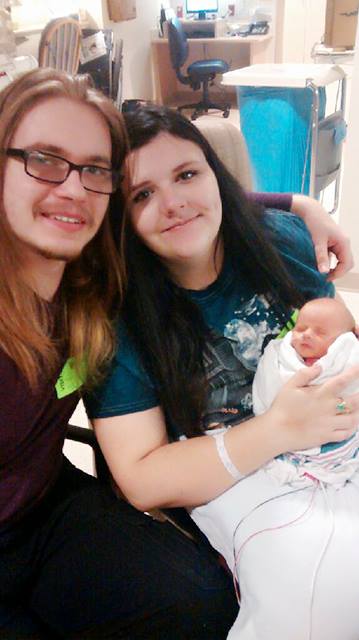
I've babbled for awhile now, so I'll summarize my story to the best of my ability. Here's one of the only photos I have of the three of us from right after our sweetie was born.
I was a pregnant teenager. I was stressed out. I was unhappy where I lived, which fed my habit of stress eating and I wasn't eating healthy.
I was too engulfed in the stress I was feeling from being unhappy with where I lived at the time. I was too overcome with the stress I felt when patients called the hospital and I had to tell them things they didn't want to hear. (I was working at the hospital at the time.)
I was so worried about what I was going to do when my daughter was born that I wasn't focused on how to survive until the time came. I was depressed about my relationship with my father. I was afraid to gain weight because I didn't want anyone from my past to give me a hard time about it.
My head just wasn't in the right place... and I paid for it.
Granted, my mom had pre-eclampsia and so did my husband's mom, so I was pretty susceptible anyway. I'd also had a handful of ongoing health concerns the year before I became pregnant, so maybe I would have developed pre-eclampsia anyway - I don't know.
What I do know is that the stress literally almost took my life.
I continued to work full time until I was exactly 32 weeks pregnant. I'd been feeling bad for a week or so. I was stressed out, I didn't have any energy, and I was swollen.
I had my 32 week check up that morning. I was never impressed with the office I used while I was pregnant, but I was limited on where I was able to be seen so I stayed with them throughout my pregnancy.
On the morning of my 32 week check up, my blood pressure was high for the first time and I had protein in my urine.
I explained to the nurse practitioner who was supposed to be my OBGYN that I was concerned I'd developed pre-eclampsia because I was swollen, exhausted, and had some abdominal pain.
Despite my blood pressure and the protein in my urine, she literally laughed at me and said, "Yeah, okay. If you had pre-eclampsia you wouldn't even be sitting up talking to me right now. You're fine."
What I wanted to say was, "First of all, bitch, I have a handful of symptoms and the nurse I've been seeing outside of your office is concerned that I have it, too."
But, anyone who knows me knows I usually bite my tongue. I have to be nice... every single time.
I accepted her disrespect and I went to work.
By the time I clocked out that day, I was almost completely depleted of energy. I was dizzy.
I tripped and fell during the walk to my car and my ankle swelled up worse than it already had. I made it home and took a bath. (Yes, I did a no-no and took a hot bath.)
When I got out of the bathtub, my mom and husband looked at me and said, "Okay, you're going to the hospital."
My whole body was puffy, I was red, hot, and looked horrible overall.
I made it to the emergency room where I was immediately diagnosed with pre-eclampsia.
I remember the words that broke my heart... the words that still bring tears to my eyes when I think of how my heart felt at the moment I heard the doctor's words.
"Your baby is okay. You are not."
I said, "Okay..."
He said, "You have pre-eclampsia. You're not going back to work. In fact, you're not going home until you deliver."
"When will that be?" I asked.
He told me, "I don't know. Could be anywhere between now and the day you're 37 weeks pregnant." I was exactly 32 weeks pregnant that day.
I ended up delivering via c-section at 33 weeks and 5 days; my baby was almost two months premature. I was in the hospital for a total of sixteen days.
My baby went straight to NICU, where she stayed for 18 days, but so far she hasn't had any permanent complications that have stemmed from her being born early.
Here's a photo of my trooper:
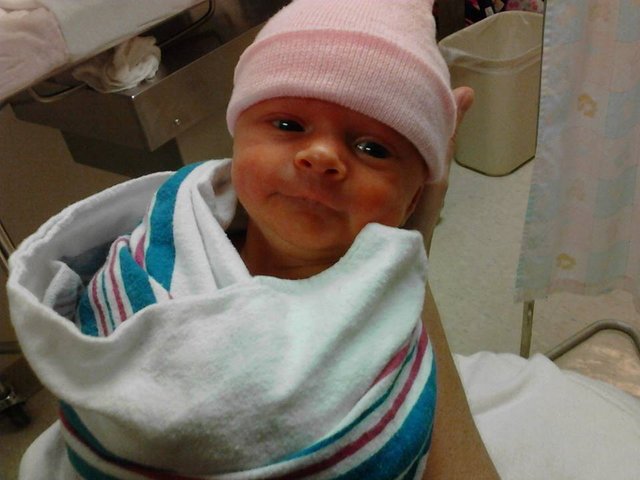
The c-section was rough and the healing time was stressful, but those are topics I'll save for another day.
I really wanted to share my story with women and fathers to be all over the world who are looking for someone to relate to.
Pre-eclampsia is a serious disease and it should not be taken lightly. Sixteen days in the hospital were no fun. If you're diagnosed with pre-eclampsia but you're on bed rest at home, please keep a journal of your health and monitor it constantly.
Things can go downhill very quickly.
In my experience, my blood pressure rose up to around 180/120. The protein in my urine rose an enormous amount - like over 14,000 mg.
My doctors said I was either about to go into kidney failure or I was going to start having seizures, so they came to my room around 11 a.m. on October 02, 2015, and told me I would be having a c-section at 4 p.m. that day.
They said my body could not physically handle pushing her out.
I'll wrap things up now...
I hope you gained some insight today on the dangers of pre-eclampsia. If I left anything out, please let me know. I want to be as informative as possible for anyone who's looking for help.
Most women stop having pre-eclampsia as soon as they give birth. I have heard of rare cases where some women suffer from pre-eclampsia for a few weeks after they give birth, but like I said - those are very rare cases.
Please remember again that some women have pre-eclampsia without symptoms; you must get a head start on monitoring your health. Sometimes your only symptoms are silent or invisible, and pre-eclampsia isn't something you want hiding under a shadow.
As far as knowing what to expect where delivering is concerned, that's something only your medical provider can speak to you about.
From what I've learned, most hospitals and doctors will do everything they can to keep you pregnant until you're 37 weeks along. Clearly, though, that can't always happen.
Your delivery date will strictly depend on your unique situation. I didn't even know if I was pushing or having a c-section until the day of delivery.
I'll tell you in advance that once you're diagnosed with pre-eclampsia and you're stuck in the hospital, one of the hardest parts to accept is waking up every morning and being told you might go into labor that same exact day or you might go into labor in five weeks - but either way you can't go home until that baby is born.
Whether you have pre-eclampsia or you're just educating yourself in case, I wish you the best and I thank you for reading this far. I would love to hear about your personal experiences with pregnancy and pre-eclampsia in the comments.
*Always feel free to leave a suggestion in the comments for other topics you'd like for me to cover - even if it's not related to pregnancy or children. I like to write about all sorts of stuff. :)
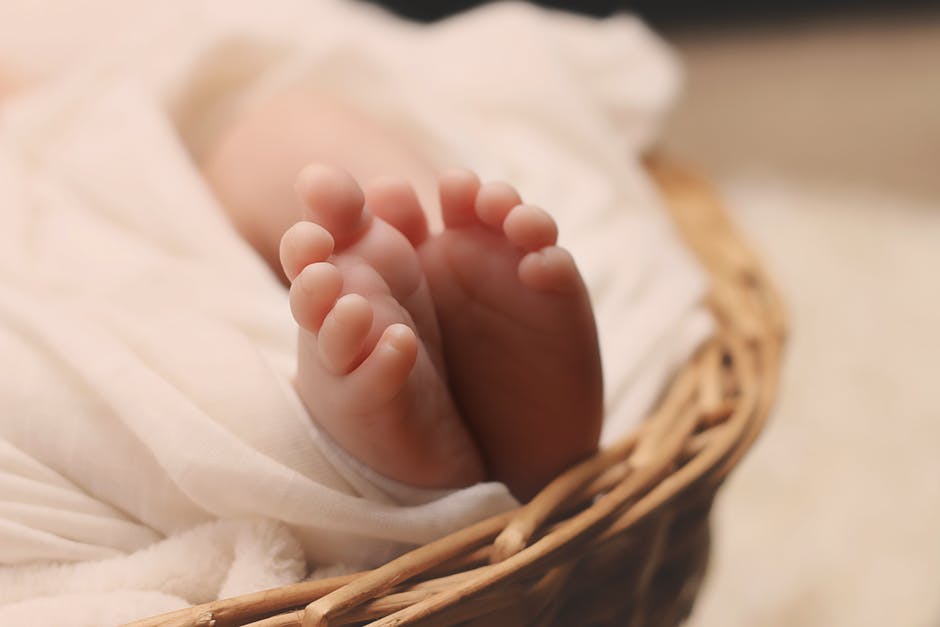
Congratulations @nataleejean! You have completed some achievement on Steemit and have been rewarded with new badge(s) :
Click on any badge to view your own Board of Honor on SteemitBoard.
For more information about SteemitBoard, click here
If you no longer want to receive notifications, reply to this comment with the word
STOPDownvoting a post can decrease pending rewards and make it less visible. Common reasons:
Submit